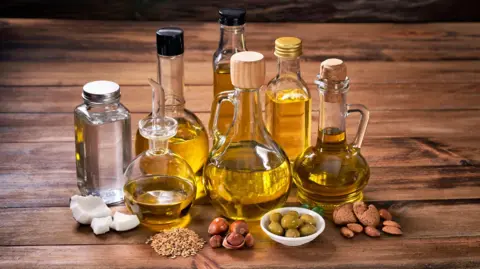 Getty Images
Getty ImagesSupermarket shelves are packed with oils from budget bottles of sunflower and vegetable oil to pricier olive, avocado and coconut oils claiming health benefits.
Oils and fats have been at the centre of nutritional debate for years and to understand why it matters, it helps to look at the different types of fat they contain.
Not all fats behave the same way in the body – some raise cholesterol while others help lower it.
Cholesterol is a natural fatty substance produced in the liver and can also be found in some of the foods we eat. Too much bad cholesterol can lead to a build-up of fatty deposits inside the walls of blood vessels, causing them to become narrowed or blocked.
With so many shifting messages, knowing which product to pick can often feel overwhelming.
Nita Forouhi, Professor of Population Health and Nutrition at the University of Cambridge, tells the BBC’s Sliced Bread podcast that no single oil holds the magic key to health and debunks three common myths about cooking oils.
1. Use sunflower and vegetable oil for cooking
 Getty Images
Getty ImagesRapeseed oil (commonly sold as vegetable oil) and sunflower oils often get bad press with some claiming they are ultra-processed and can cause inflammation which can be damaging to cardiovascular health.
But, there isn’t evidence to back this up.
In fact, these oils contain a low amount – 5-10% – of unhealthy saturated fats and are high in healthier mono- and polyunsaturated fats. Polyunsaturated fats (including omega-3 and omega-6) are essential for brain and heart health.
Forouhi says that these oils are “absolutely good for us”.
She explains that they can offer a reduction in disease risk “when saturated fats [which can raise bad cholesterol] like butter, lard or ghee are replaced with these oils”.
At around £2 per litre in most supermarkets it’s also a more budget friendly option for cooking at home.
2. Margarine can help reduce bad cholesterol
 Getty Images
Getty ImagesMargarine has had a bad reputation for years and many of us believe we should steer clear of it.
That’s because it used to contain harmful trans fats which are strongly linked with cardiovascular disease but modern day margarines “have close to zero amounts of trans fats” according to Forouhi. “So it can actually be part of a healthy diet and reduce the bad cholesterols.”
Butter also isn’t off the menu entirely. “If you love butter, for instance on your toast, by all means have it,” says Forouhi.
You can use both margarine and butter for cooking, but Forouhi recommends sometimes swapping them out for oil instead which has less saturated fat in.
UK health guidelines advise to keep your saturated fat intake below 10% of calories and this is easier to do if you’re using oil to cook with instead of butter.
3. Olive oil isn’t suitable for deep frying
 Getty Images
Getty ImagesOils behave differently when heated which makes some of them unsuitable for frying.
Extra virgin olive oil, for example, is packed with antioxidants and beneficial compounds but its low smoke point means it is better for salad dressings or drizzling over food rather than deep frying.
A smoke point is the point at which the fats in the oil start to break down and nasty compounds are released which can make the oil taste bitter, burnt or unpleasant.
Restaurateur Tim Hayward says for shallow frying he uses a basic olive oil.
But for deep frying something like chips or battered fish, vegetable or sunflower oil is best as they withstand higher temperatures without breaking down.
Some studies have also shown that oils heated to above their smoke point release toxic chemical by-products.
But Professor Forouhi says that type of cooking in the home is not very common and that long-term health studies still show that vegetable oils “without exception are related with better outcomes for chronic diseases.”
Which oils should I be using?
If you’re looking for a simple kitchen strategy:
- For everyday cooking: Sunflower or rapeseed oil are affordable, healthy, and versatile. You could also use a basic olive oil
- For salads and finishing dishes: Extra virgin olive oil adds flavour and health benefits
- For deep frying: Stick with a high smoke point oil like vegetable or sunflower
- For flavour variety: While they may not have the same health benefits as olive oil, you could use sesame, coconut or avocado oils for cold dishes if you like the flavour
Overall, Professor Forouhi says it is better to look at your whole diet rather than obsess over which bottle to buy.
“I would recommend going with what taste and cost considerations you have and experiment with different types of oil that will bring you some health benefits,” she explains.

Sign up here to receive our weekly newsletter highlighting uplifting stories and remarkable people from around the world.

